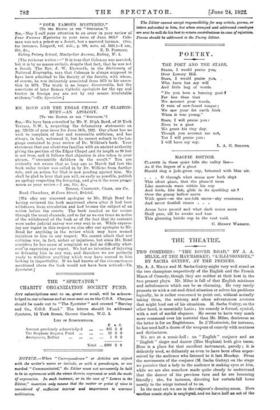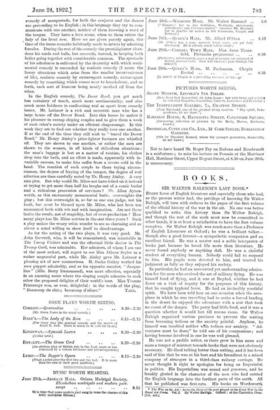THE THEATRE.
TWO COMEDIES " THE DOVER ROAD," BY A. A. MELNTE, AT THE HAYMARKET; "L'ILLUSIONISTE," BY SACRA GUITRY, AT THE PRINCES.
Mn. A. A. Mnasra and M. Bache Guitry might very well stand as the two champions respectively of the English and 'the French Muses of Comedy, though they are neither at their best in the two present plays. Mr. Milne is full of that English mistiness and nebulousness which can be so charming. Ile very rarely presents us with a cut-and-dried situation or solves his problems logically, he is rather concerned to point out, without actually taking them, the enticing and often adventurous avenues that might lead out of Es situations. M. Bache Guitry, on the other hand, is essentially Latin.; his comedy is formal, cynical, with a sort of sordid elegance. He seems to have very much more command over his material than Mr. Milne, dexterous as the latter is for 'an Englishman. InL'Illusionisle, for instance, he has used half a dozen of the weapons of comedy with neatness and distinctness.
We are at a musie-hall : an " English " conjurer and an " English " singer and dancer (Miss Hopkins) both give turns. Here is a place for that excellent instrument, parody ; it is delicately used, so-delicately as even to have been often unper- ceived by the audience who listened to it 'last Monday. From the movements of the conjurer (M. Sa,cha Guitry) on the stage we perceive that a lady in the audience is making eyes at him, while we are also somehow made quite clearly to understand that the dancer of the previous turn and he are becoming friendly ; she, for instance, directing her curtain-fall bows meetly to the -wings instead of toms.
In the next act we are in the conjurer's dressing-room. Here Another comic style is emplayed,,and we have half an ant of the
comedy of masquerade, for both the conjurer and the dancer are pretending to be English ; in this language they try to com- municate with one another, neither of them knowing a word of the tongue. They have a love scene, when to them enters the lady of the front row. Here we are given parody again, this time of the inane remarks habitually made to artists by admiring females. During the rest of the comedy the prestidigitator aban- dons his cards and balls, but succeeds, instead, in keeping both ladies going together with considerable neatness. The spectacle of his adroitness is enlivened by the dexterity with which senti- mental comedy is succeeded by realistic comedy (I mean the funny situations which arise from the smaller inconveniences of life), realistic comedy by extravagant comedy, extravagant comedy by something which comes near to knockabout, and so forth, each sort of humour being neatly marked off from the other.
In the English comedy, The Dover Road, you get much less certainty of touch, much more sentimentality, and also much more boldness in confronting real as apart from comedy issues. Mr. Latimer is a rich and eocentrio man who has a large house off the Dover Road. Into this house he makes it his pleasure to entrap eloping couples and to give them a week of each other's society under an efficient chaperonage. In this week they are to find out whether they really love one another. If at the end of the time they still wish to " travel the Dover Road," Mr. Henry Ainley's prize-fighter footmen are whistled off. They are shown to one another, or rather the men are shown to the women, in all kinds of ridiculous situations : the man's luggage is lost as a matter of routine, his clothes drop into the bath, and an effort is made, apparently with in- variable success, to make him suffer from a. severe cold in the head. The reaction of each couple to these trying circum- stances, the degree of fraying of the temper, the degree of real affection are then carefully noted by Mr. Henry Ainley. A very nice plot. But why could Mr. Milne not have relied on it instead of trying to get more than half his laughs out of a comic butler and a ridiculous procession of servitors ? Mr. Allan Aynes- worth, as this enormously monumental butlel, overweights the play ; but this overweight is, so fax as one can judge, not his fault, but must be blamed upon Mr. Milne, who has been too economical both with wit and with imagination. Are not these faults the result, not of stupidity, but of over-production ? How many plays has Mr. Milne written in the test three years ? Such a play makes the weary critic wonder to see so charming and so clever a mind willing to show itself to disadvantage.
As for the acting of the two plays, it was very good. Mr. . John Deverell, who, it will be remembered, was inimitable in The Young Visiters and was the effectual little doctor in The Trump Card, was admirable. Her admirers, of whom I am one of the most ardent, will regret to see Miss Athene Seyler in a rather ungrateful part, while Mr. Ainley gave Mr. Latimer a pleasing set of new mannerisms. M. Sacha Guitry worked his own puppet admirably, and as his opposite number, " Jacque- line" (Mlle. Betty Daussmond), was most effective, especially in an amusing scene where the eloping couple rehearse to each other the proposed delights of their world's tour. Miss Yvonne Printemps was, as ever, delightful : in the words of the play,
" 13eaucoup de chic ; beaucoup d'allure." TARN.



































 Previous page
Previous page